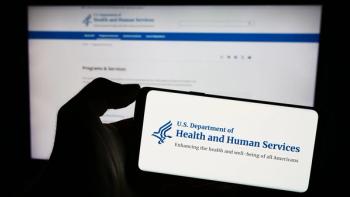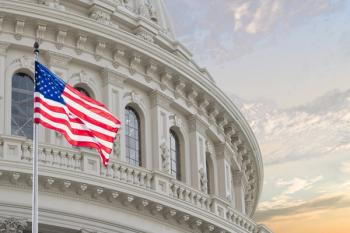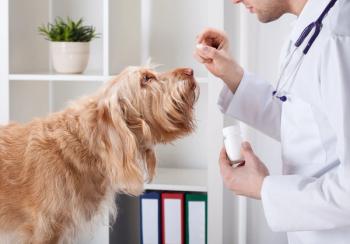
The political balance: Veterinary measures hang as Congress adjourns
Washington- As the U.S. House and Senate adjourn for election season, a myriad of veterinary-related bills sit untouched and stand to falter due to lack of time and congressional attention.
WASHINGTON— As the U.S. House and Senate adjourn for election season, a myriad of veterinary-related bills sit untouched and stand to falter due to lack of time and congressional attention.
Big initiatives on the chopping block include the National Veterinary Workforce Expansion Act, Small Business Health Fairness Act and funding for the National Veterinary Medical Services Act, to name a few. By all accounts, the American Horse Slaughter Prevention Act has received the most attention, grabbing media spotlight Sept. 7 as House members passed an initiative to shut down the horse meat industry. Yet even that measure sits idle on the Senate side.
Convinced by a consortium of lobbying activists to close the nation's three horse slaughter plants, the House's action this fall largely ignored the American Veterinary Medical Association's (AVMA) opposition to end the practice based on a "humane euthanasia" need for the country's unwanted horse population.
Strong emotions exist on both sides of the debate. "Just the name of this bill makes it a hard thing to fight," AVMA Governmental Relations Division (GRD) Director Dr. Mark Lutschaunig says. But apart from the controversy, S. 1915 appears doomed to fail this year. "The Senate right now has other things they feel are more important to deal with," Lutschaunig contends. Like other initiatives, its consideration suffers from an overworked Congress still busy with appropriations measures, he explains.
NVMSA
One such appropriations measure is FY 2007 Agriculture Appropriations Bill, which includes $750,000 in funds for the National Veterinary Medical Services Act (NVMSA) on the Senate side but no companion line item in the House. Passed in 2003, NVMSA authorizes the Secretary of Agriculture to establish a loan repayment program for veterinarians who agree to serve in veterinary shortage and emergency situations. In 2005, $500,000 was appropriated to establish a pilot program this year. But the Cooperative State Research, Education and Extension Service remains in the process of writing allocation rules before funds can be doled out to veterinarians.
Garnering continued resources for the program is an uphill battle, considering the congressional session's short timeframe and the government's tight budget, Lutschaunig explains.
"It's really just a bunch of politics," he says. "The agriculture appropriations bill hasn't been taken up by the Senate, so at this late date, I think we'll end up with some type of omnibus bill that covers all the appropriations measures that haven't passed. I can't really predict what will happen, but we for sure won't gain more than last year's funding on an omnibus, which is $500,000. We'll have to continue to work on that."
Expansion act
The GRD office also lobbies for the Veterinary Workforce Expansion Act, which requests $1.5 billion over 10 years to expand the size of veterinary schools and increase the number of DVMs trained in public health and biomedical research.
Like AVMA, the Association of American Veterinary Medical Colleges champions the initiative and describes the future shortage of such veterinarians as "critical."
Still, the bill remains buried in House and Senate committees.
"While we've generated a lot of support for this issue, it doesn't seem like it will move this year," Lutschaunig says.
Health insurance
Neither do two bills designed to make staff health insurance more affordable to association members. The Small Business Health Fairness Act and the Health Insurance Marketplace Modernization and Affordability Act allow small business owners, including veterinarians, to join national associations to garner better buying power when providing health insurance to employees.
A myriad of state laws currently bar national blanket policies thereby leaving small business owners out in the cold when it comes to negotiating better rates for employee health insurance, officials contend.
While the House has passed the initiative several times, the Senate has never moved on such a bill. The measure has gained little traction in the 109th Congress, insiders say.
"I just don't think it's likely either of those bills will move this year," Lutschaunig says.
Political maneuvering
Still, the session isn't over, and the Nov. 7 elections promise to influence any last minute legislative wrangling. "If Democrats win, the Republicans likely will come back to push things through, especially if they can get enough votes to overcome a filibuster," Lutschaunig predicts. "If that's the case, I suspect there's no reason for Democrats to rush and push their agenda forward. They might want to sit tight and not do anything until next Congress when they can have more of an impact."
The Animal Fighting Prohibition Enforcement Act could be a product of such a delay. While the measure to authorize felony-level jail time for violations of the federal animal fighting law, and prohibit interstate and foreign commerce of cockfighting weapons passed the Senate, it remained stuck in House Judiciary Committee at presstime.
The Captive Primate Safety Act faces a similar fate. Passed unanimously by the Senate in June, the bill amends the Lacey Act Amendments of 1981 by inserting "non-human primates" to the list of prohibited wildlife, making it illegal to import, export, transport, sell, receive, acquire or purchase these animals. At presstime, the measure was held up in the House Committee on Resources.
"No one knows where these things can go," Lutschaunig says. "Congress could come back for one full week in November; there are a lot of appropriations," he says. "But really anything can happen, especially if power shifts after the elections in one or both houses."
Newsletter
From exam room tips to practice management insights, get trusted veterinary news delivered straight to your inbox—subscribe to dvm360.




